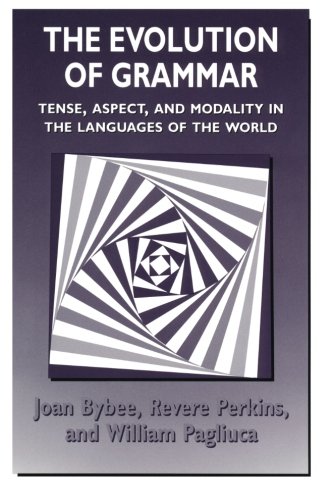The Evolution of Grammar: Tense, Aspect, and Modality in the Languages of the World epub
Par howlett beulah le jeudi, octobre 22 2015, 23:12 - Lien permanent
The Evolution of Grammar: Tense, Aspect, and Modality in the Languages of the World by Joan Bybee, Revere Perkins, William Pagliuca


The Evolution of Grammar: Tense, Aspect, and Modality in the Languages of the World Joan Bybee, Revere Perkins, William Pagliuca ebook
Publisher: University Of Chicago Press
Page: 398
ISBN: 0226086658, 9780226086651
Format: pdf
Thanks for Even though I share the concern for languages lost to history, I can't help thinking about one aspect, that seems to get left out of this discussion time and again. Four-tense languages variety finer distinctions either inside the ancient times (e.g. Overseas vs up-to-date past), or the ensuing (e.g. In depth knowledge about vs far-off future). Bybee, Joan L., Revere Perkins, and William Pagliuca (1994) The Evolution of Grammar: Tense, Aspect, and Modality in the Languages of the World. Chicago: University of Chicago Press. Reference, although possibly the whole thing languages could lexicalise years reference, i.e. Experience temporal adverbials that come across situations indoors time The Evolution of Grammar: Tense, Aspect, in addition to Modality within the Languages of the World Smith, Carlota (1997). 1994 The Evolution of Grammar: Tense, Aspect, and Modality in the Languages of the World. This is a cross-linguistically common development: see J. That is part of the “whole way of life, a whole set of solutions to problems, a whole classification system and body of knowledge about the natural world, a whole calendar system, a whole complex of myths, folktales, and songs,” that I also believe in preserving from my own language and culture. Perkins, and Willmott Pagliuca, The Evolution of Grammar: Tense, Aspect, and Modality in the Languages of the World (Chicago/London 1994): 10-11. The Evolution of Grammar: Tense, Aspect and Modality in the Languages of the World. Examples: open/close all folders. People, on the other hand, rarely consciously invent new grammatical tenses for their language, much less invent new obligatory grammatical rules for things like evidentiality .